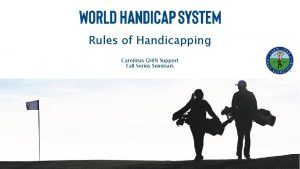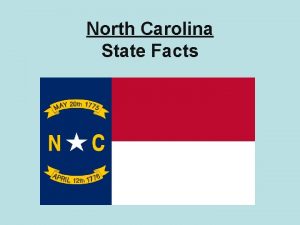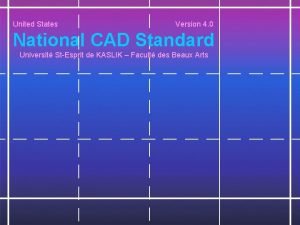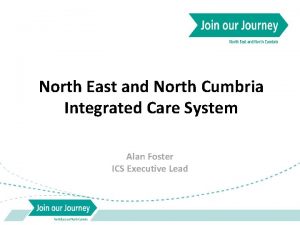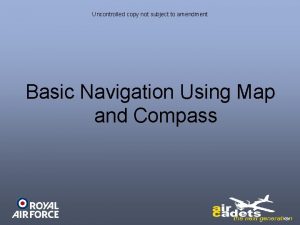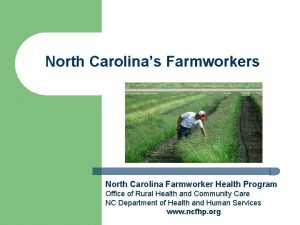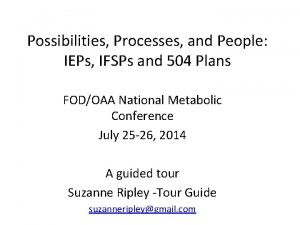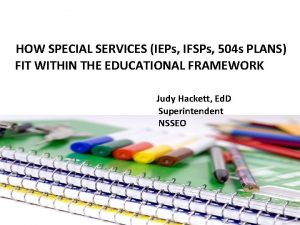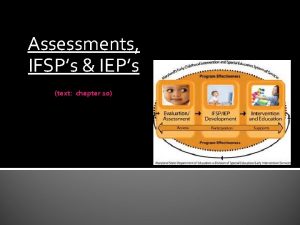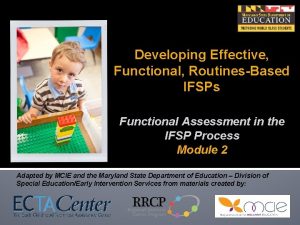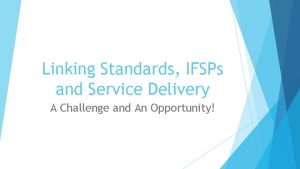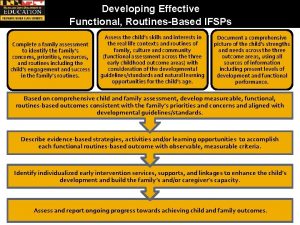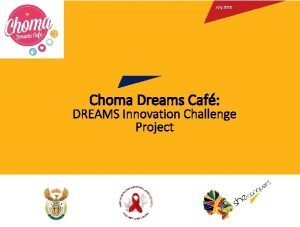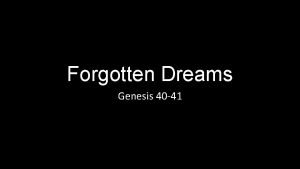Needs Dreams IFSPs North Carolinas Orientation to the
















































- Slides: 48

Needs, Dreams, & IFSPs North Carolina’s Orientation to the Individualized Family Service Plan

Welcome to the NC Infant-Toddler Program Needs, Dreams, and IFSPs Online Training This is an introductory course designed for professionals new to early intervention (EI) in North Carolina. New EI employees should check with their supervisors before formally taking this course for credit. This material, combined with study guide activities, will point new staff in the right direction for best practice in IFSP development. 1

What This Training Covers The Needs, Dreams, and IFSPs online course is training that introduces new Infant. Toddler Program (ITP) Early Intervention staff to the Individualized Family Service Plan (IFSP) as the instrument specified by the NC ITP for implementing services for eligible infants and toddlers and their families. The IFSP is both a process and a written document that involves a collaborative planning effort and partnership between the parent/family and professionals offering services and supports to the child and family. The written plan provides documentation of desired outcomes, services and strategies to meet outcomes, and the results of intervention efforts. Visit these links to view NC’s IFSP (vertical & horizontal formats). You need to print one copy of an entire IFSP. 2

Who Should Complete This Training The target audience for the Needs, Dreams, and IFSPs online course is early interventionists who play a role in developing IFSPs for families with children with special needs. This audience includes, but is not limited to, the following: Child Care Providers Early Intervention Service Coordinators (required) Early Intervention Network Providers Family Members Other IFSP Team Members Social Services Caseworkers Specialized Therapists 3

Objectives The individuals exploring Needs, Dreams, and IFSPs online will acquire a core of introductory information on which to build a foundation of competence in IFSP development. With their supervisors’ direction and approval, new CDSA staff will study online material and complete the accompanying study guide. Completion of this training will result in meeting the following objectives. Objectives The learners will: Gain an understanding of the process of IFSP development; Identify the required elements of the IFSP; Develop functional, family-centered outcomes; Apply family-centered practice in facilitating the IFSP process; and Develop service delivery plans using the current IFSP form. 4

Methods CDSA staff must: Study online course material; Read and examine built-in documents or other presentations; Explore embedded links; Read indicated Infant. Toddler Program Manual bulletins; Develop a list of follow-up questions; and Complete accompanying study guide This training is designed to be used by individuals, but it is not limited to this approach. Participants may also work in pairs or small groups. Another option would be for individuals to study one part at a time and then come together in small groups to review. This segmented approach may allow time for more focused discussions on topics of concern. 5

Course Protocol Taking this online course for credit toward competency in Interdisciplinary Family Service Planning in the Infant. Toddler Certification Program involves the following steps for CDSA staff: Supervisors w suggest when and how staff study required material Staff w study the online course material w complete the accompanying study guide w participate as directed in recommended and/or supplemental activities Staff with Supervisors: w complete required activities with staff w complete documentation form for personnel credit 6

Navigating the Training The training is divided into four (4) parts. Each part addresses a major idea/focus area for IFSP development, and is followed by suggested and required learning activities for completion with a supervisor or mentor. Upon completion of each section and required activities, you will be directed to the next section. 7

Needs, Dreams, and IFSPs Outline Part II Focus on the Family and the Child Click here to print the REQUIRED Needs, Dreams, & IFSPs Study Guide. Part I Overview of the IFSP Process Part IV Facilitating Reviews & Transitions Part III Developing Outcomes, CDSA staff Activities, & Service Plans need to complete the Study Guide in order to receive credit for this training. 8

Part I Overview of the IFSP Process 9

Module 1 A: Family-Centered Principles A Foundation for Successful IFSPs 10

After completing this module, the learner will be able to… 1. 2. Describe family-centered principles underlying the process of developing and writing IFSPs; and Demonstrate increased sensitivity to typical concerns families have upon entering the Infant-Toddler Program. 11

An IFSP Story An IFSP provides the basis for family-centered early intervention that meets the unique needs of each child and family. To write IFSPs that help families reach their goals, professionals must adhere to family-centered principles of service planning and delivery. They must truly understand the perspective of each family with whom they work. To begin this training, you will meet Latisa and her family and begin to understand how the IFSP process looks and feels from their point of view. You will see family-centered principles at work as you follow them through their enrollment in the Infant-Toddler Program, Please open your Study Guide to Activity 1 and review the questions to consider as you read the Click here to story. read about Latisa and her family’s IFSP story. 12

Study Guide Activity 1: When you finish reading about Latisa and her family, please answer the questions in Activity 1 before proceeding to the next page. 13

The story of Latisa and her family illustrates important family-centered principles underlying best practices for developing IFSPs. These principles are reviewed next. Mc. Gonigel (1991) outlined the following principles to guide the process of developing IFSPs. Use Activity 2 in the Study Guide to record examples of these principles in action from the story of Latisa and her family. 14

Principles Underlying the IFSP Process Infants and toddlers are uniquely dependent on their families for their survival and nurturance. This dependence necessitates a family-centered approach to early intervention. States and programs should define “family” in a way that reflects the diversity of family patterns and structures. Each family has its own structures, roles, values, beliefs, and coping styles. Respect for and acceptance of this diversity is a cornerstone of family-centered early intervention. Early intervention systems and strategies must honor the racial, ethnic, cultural, and socio-economic diversity of families. Source: Mc. Gonigel, M. J. (1991). Philosophy and conceptual framework. In M. J. Mc. Gonigel, R. K. Kaufmann, & B. H. Johnson (Eds). Guidelines and Recommended Practices for the Individualized Family Service Plan, 2 nd ed. Pp. 7 -12). Bethesda, MD: Association for the Care of Children’s Health. 15

Principles Underlying the IFSP Process, Continued Respect for family autonomy, independence, and decisionmaking means that families must be able to choose the level and nature of early intervention’s involvement in their lives. A collaborative approach to working with families requires that professionals reexamine their traditional roles and practices and develop new practices when necessary; practices that promote mutual respect and relationships. Early intervention services should be flexible, accessible, and responsive to family-identified needs. Source: Mc. Gonigel, M. J. (1991). Philosophy and conceptual framework. In M. J. Mc. Gonigel, R. K. Kaufmann, & B. H. Johnson (Eds). Guidelines and Recommended Practices for the Individualized Family Service Plan, 2 nd ed. Pp. 7 -12). Bethesda, MD: Association for the Care of Children’s Health. 16

Principles Underlying the IFSP Process, Continued Early intervention services should be offered according to the normalization principle – that is, families should have access to services provided in as normal a fashion and environment as possible and that promote the integration of the child and family within the community. No one agency or discipline can meet the diverse and complex needs of infants and toddlers with special needs and their families. Therefore, a team approach to planning and implementing the IFSP is necessary. Family/professional collaboration and partnerships are the keys to family-centered early intervention and to successful implementation of the IFSP process. Source: Mc. Gonigel, M. J. (1991). Philosophy and conceptual framework. In M. J. Mc. Gonigel, R. K. Kaufmann, & B. H. Johnson (Eds). Guidelines and Recommended Practices for the Individualized Family Service Plan, 2 nd ed. Pp. 7 -12). Bethesda, MD: Association for the Care of Children’s Health. 17

Study Guide Activity 2: Please complete Activity 2 in your Study Guide before proceeding to the next page. 18

Principles in Action Note that there are other connections that will become evident later in the process. You may want to have a conversation with a mentor or supervisor about how these principles are carried out in his or her work. 19

By reading about Latisa and her family and by reviewing the information in this module, you have learned family-centered principles underlying the IFSP process and become more aware of how the process is experienced by families. The partnership between families and professionals is strengthened by following these family-centered principles. Requirements of the Individuals with Disabilities Education Act (IDEA), presented in the next module, support implementation of these principles. 20

Module 1 B: IDEA and Required Elements of the IFSP Process 21

After completing this module, the learner will be able to… 1. 2. Describe major requirements and elements of the IFSP as specified by the IDEA; and Outline the process of entry into the Infant-Toddler Program in North Carolina. 22

Required Elements of the IFSP Part C of IDEA contains specific requirements for the IFSP. How these requirements take shape varies within each state’s early intervention system and with every individual child and family. IDEA includes requirements in the categories listed on this page. Further information about requirements in each category is reviewed on the following pages. Assessment and Program Development Periodic Review Promptness after Assessment Content of the Plan Parental Consent Accessibility and Convenience of Meetings Participants in Meetings 23

Assessment & Program Development Requirements The family will receive a multidisciplinary assessment of the unique strengths and needs of the infant or toddler and the identification of services appropriate to meet such needs. The family will have the opportunity to participate in a voluntary family-directed assessment of the resources, priorities, and concerns of the family, and the identification of supports and services necessary to enhance the family’s capacity to meet the developmental needs of their infant or toddler. The family will receive a written IFSP developed by the multidisciplinary team that includes the parent or guardian. The IFSP is to be based on the multidisciplinary evaluation and assessment of the child and, with the concurrence of the family, the assessment of the families resources, priorities, and concerns. Definition: Multidisciplinary means the involvement of two or more disciplines or professions in the provision of integrated and coordinated services, including evaluation, assessment, and development of the IFSP. 24

Periodic Review Requirements The IFSP must be evaluated and revised once a year and the plan reviewed every six months. Reviews can occur more often when appropriate, based on the infant’s or toddler’s and family’s needs. Members of the IFSP team, which include the family, can request a review of the plan at any time. The annual evaluation meeting incorporates the semi-annual review process, so only one separate periodic review is required each year, unless conditions warrant additional reviews. 25

Requirements about Promptness after Assessment The IFSP is to be developed within a reasonable time after the required evaluation/assessment is completed. The initial IFSP must be completed within 45 calendar days of the child’s referral to the early intervention system’s point of entry. With the parent’s consent, an interim IFSP can be developed and early intervention services can begin before completion of this evaluation/assessment. Services required under the ITP and listed on the IFSP are to begin within 30 days from the completion of the IFSP and carried out within the specifications of the IFSP. 26

Requirements about the Content of the Plan The IFSP must be in writing and must contain the following content areas: 1. A statement of the infant’s or toddler’s present level of development in five areas – physical, cognitive, communication, social or emotional, and adaptive – based on acceptable objective criteria; 2. A statement of the family’s concerns, priorities, and resources related to enhancing the development of their infant or toddler with a disability or developmental delay (the voluntary family-directed assessment); 3. A statement of major outcomes expected to be achieved for the infant or toddler and the family; 27

Requirements about the Content of the Plan, Continued 4. 5. 6. 7. The criteria, procedures, and timelines used to determine the degree to which progress toward achieving the outcomes is being made and whether modifications or revisions of the outcomes or services are necessary; A statement of the specific early intervention services necessary to meet the unique strengths and needs of the infant or toddler and the family; A statement of medical and other services that the child needs, but are not required under Part C, including the frequency, intensity, method, and location for delivering services; Payment arrangements, if any; 28

Requirements about the Content of the Plan, Continued 8. 9. 10. 11. A statement of the natural environments in which early intervention services will be appropriately provided; A justification of the extent, if any, to which the services will not be provided in a natural environment; The projected date for initiation of services and the anticipated duration of services; The name of the service coordinator from the profession most immediately relevant to the infant’s or toddler’s and the family’s needs, or who is otherwise qualified to carry out all the applicable responsibilities of implementation of the plan and coordination with other agencies and persons; and 29

Requirements about the Content of the Plan, Continued 12. The steps to be taken supporting transition of the toddler with a disability of developmental delay to services provided under Part B, to the extent such services are considered appropriate, or to other community-based services. The content of the IFSP must be fully explained to the parents or guardian in understandable language. North Carolina’s IFSP form, to be introduced in Part II of this training, includes all of the requirements listed above. 30

Parental Consent Requirements The content of the IFSP is to be fully explained to the parents or guardian and informed written consent must be obtained prior to the provision of early intervention services described in the plan. If the parents or guardian do not provide consent with regard to a particular early intervention service, then the early intervention services for which consent is given are to be provided. NOTE: Parental consent is required under Part C in order for at least the following activities to occur: 1. Evaluation and assessment; 2. Delivery of early intervention services; and 3. Release of information from the early intervention record. 31

Requirements about Accessibility and Convenience of Meetings IFSP meetings must be conducted in settings and at times convenient to families and in the native language or other mode of communication used by the family, unless clearly not feasible to do so. Arrangements for meetings must be made with, and written notice provided to the family and other participants early enough before the meeting date to ensure that they will be able to attend. 32

Requirements about Participants in Meetings Each initial meeting and annual meeting to evaluate the IFSP must include the following participants: 1. The parent(s)/guardian of the child; 2. Other family members as requested by the parent, if feasible; 3. An advocate or person outside the family, if the parent requests that the person participates; 4. The service coordinator working with the family; 5. Person(s) directly involved in conducting the evaluations and assessments; and 6. Persons who will be providing services to the child or family, as appropriate. 33

Requirements about Participants in Meetings, Continued Each semi-annual review must provide for the participation of persons listed in items 1 -4 and 6. If any of the persons listed (on the previous page) are unable to attend either the initial, semi-annual, or annual meetings, arrangements must be made for their involvement by: w telephone conference call, w having a knowledgeable authorized representative attend, or w making pertinent records available at the meeting. 34

The IFSP in North Carolina is designed to meet all of the requirements of Part C of IDEA, as described on the previous pages. Your knowledge of, and adherence to, all of these requirements helps to ensure that families receive high quality, family-centered early intervention services. 35

Study Guide Activity 3: Please complete Activity 3 in your Study Guide before proceeding to the next page. 36

Study Guide Activity 3: Answers Click here to view answers to Study Guide Activity 3. 37

Entry into the Infant-Toddler Program in North Carolina The entry process into the ITP is designed to meet all Part C requirements and facilitate a smooth transition for families. Family-centered principles guide this process, which is described next. 38

view a Click here to Chart of the Flow s Entry Proces This flow chart shows the entry process from the time a child is referred to the ITP to the time the initial IFSP is written. Parents may choose to stop eligibility determination or withdraw from ITP enrollment at any time. 39

Summary of Steps in the Entry Process Children who enter the Infant-Toddler Program typically proceed through the Click here to see the bulletin from the NC following steps. The order of the steps may ITP Manual describing the vary, but all steps must be accomplished Referral Process and the IFSP must be written within 45 calendar A child days. who is identified as potentially eligible by a referral source such as a physician, parent, child care program, health department, or other agency MUST BE REFERRED to the CDSA. The CDSA assigns a service coordinator within 2 business days. Entry level evaluation of the child’s development and needs is completed. Eligibility for the Infant-Toddler Program is determined. IFSP is developed. Children who are found not eligible for the ITP are referred to the Child Service Coordination Program at the local Health Department, or to other community agencies as appropriate. 40

The Entry Process for Latisa and Her Family Latisa’s pathway of entry into the Infant. Toddler Program is typical for children whose eligibility for the program is determined by the entry level evaluation. 41

The Entry Process for Children Who are Known to be Eligible Some infants and toddlers are known to be eligible for the Infant-Toddler Program at the time of referral, such as children who have a diagnosed or documented physical or mental condition known to result in developmental delay. The pathway of entry for these children can be found in the Referral Process bulletin in the ITP Manual. Note that an entry level evaluation must still be completed, eligibility determined by the CDSA, and an IFSP developed before services can begin. 42

Variations in the Entry Process Here are some other variations in the entry process that can occur based on the child’s needs and family circumstances. Please consult the Referral Process bulletin from the ITP Manual and your supervisor to learn more about these and other variations. A parent may request that the 45 -day timeline for completing the IFSP be extended. Any delay in meeting the 45 -day requirement must be documented in the Service Coordinator’s record of the child. An interim IFSP may be completed for an eligible child so interventions that are urgently needed can begin before completion of the entry level evaluation and IFSP. When a child with hearing loss is identified, a referral is made to BEGINNINGS for Parents of Children Who are Deaf or Hard of Hearing (with written consent from the parent). When a child is referred close to his or her third birthday, plans for transition out of the ITP must be part of the entry process. This variation is covered in Part IV of this training. 43

Child and Family Rights Child and family rights as mandated by IDEA and other federal laws must be respected at all times during the entry process and throughout the family’s enrollment in the Infant-Toddler Program. Click here to view the Notice of Child and Family Rights Click here to view the NC Infant-Toddler Program Parent Handbook Click here to view the bulletin from the NC ITP Manual discussing the Notification of Child and Family Rights 44

Summary: Part I In Part I of this training, you have learned: Family-centered principles underlying the process of developing and writing IFSPs; Concerns families typically have upon entering the Infant. Toddler Program; Major requirements and elements of the IFSP as specified by the Individuals with Disabilities Education Act (IDEA); and The process by which families enter the Infant-Toddler Program in North Carolina. Please review the next two pages to learn about required and optional activities to enhance your learning from Part I before beginning Part II of the online training. 45

Learning Activities to Complete with Your Supervisor Please complete the following required learning activities with your supervisor before beginning Part II of this training. w Review Study Guide Activities 1 -3 to verify that you have completed them. w Learn more about the family’s perspective on the IFSP process and the process of entry into the Infant-Toddler Program through an on-site activity such as interviewing a family member or shadowing an Early Intervention Service Coordinator’s interactions with a family entering the program. w Discuss at least one recent case from your agency in which a family’s entry process varied significantly from the typical process. 46

Learning Activities to Complete with Your Supervisor The following optional activities are also recommended to enhance your learning. w Ask questions as needed to clarify the information presented online. w Discuss your responses to Study Guide activities with your supervisor or another staff member. 47
 Carolinas ghin support
Carolinas ghin support North carolina's state bird
North carolina's state bird Polycentric ethnocentric geocentric regiocentric
Polycentric ethnocentric geocentric regiocentric Strategic gender needs and practical gender needs
Strategic gender needs and practical gender needs Primary needs and secondary needs
Primary needs and secondary needs Types of need analysis in esp
Types of need analysis in esp Satisfaction
Satisfaction Henry murray theory
Henry murray theory Uds cad
Uds cad North east and cumbria ics
North east and cumbria ics Chapter 14 lesson 4 people of the south
Chapter 14 lesson 4 people of the south The north pole ____ a latitude of 90 degrees north
The north pole ____ a latitude of 90 degrees north True north vs magnetic north
True north vs magnetic north Thế nào là hệ số cao nhất
Thế nào là hệ số cao nhất Sơ đồ cơ thể người
Sơ đồ cơ thể người Tư thế ngồi viết
Tư thế ngồi viết Số nguyên tố là
Số nguyên tố là Hình ảnh bộ gõ cơ thể búng tay
Hình ảnh bộ gõ cơ thể búng tay đặc điểm cơ thể của người tối cổ
đặc điểm cơ thể của người tối cổ Cách giải mật thư tọa độ
Cách giải mật thư tọa độ Tư thế worms-breton
Tư thế worms-breton ưu thế lai là gì
ưu thế lai là gì Thẻ vin
Thẻ vin Thơ thất ngôn tứ tuyệt đường luật
Thơ thất ngôn tứ tuyệt đường luật Cái miệng xinh xinh thế chỉ nói điều hay thôi
Cái miệng xinh xinh thế chỉ nói điều hay thôi Các châu lục và đại dương trên thế giới
Các châu lục và đại dương trên thế giới Bổ thể
Bổ thể Từ ngữ thể hiện lòng nhân hậu
Từ ngữ thể hiện lòng nhân hậu Diễn thế sinh thái là
Diễn thế sinh thái là Tư thế ngồi viết
Tư thế ngồi viết Thế nào là giọng cùng tên?
Thế nào là giọng cùng tên? 101012 bằng
101012 bằng Hát lên người ơi alleluia
Hát lên người ơi alleluia Hổ sinh sản vào mùa nào
Hổ sinh sản vào mùa nào đại từ thay thế
đại từ thay thế Vẽ hình chiếu vuông góc của vật thể sau
Vẽ hình chiếu vuông góc của vật thể sau Công thức tính độ biến thiên đông lượng
Công thức tính độ biến thiên đông lượng Tỉ lệ cơ thể trẻ em
Tỉ lệ cơ thể trẻ em Thế nào là mạng điện lắp đặt kiểu nổi
Thế nào là mạng điện lắp đặt kiểu nổi Các loại đột biến cấu trúc nhiễm sắc thể
Các loại đột biến cấu trúc nhiễm sắc thể Lời thề hippocrates
Lời thề hippocrates Vẽ hình chiếu đứng bằng cạnh của vật thể
Vẽ hình chiếu đứng bằng cạnh của vật thể Phản ứng thế ankan
Phản ứng thế ankan Quá trình desamine hóa có thể tạo ra
Quá trình desamine hóa có thể tạo ra Kể tên các môn thể thao
Kể tên các môn thể thao Khi nào hổ con có thể sống độc lập
Khi nào hổ con có thể sống độc lập điện thế nghỉ
điện thế nghỉ Biện pháp chống mỏi cơ
Biện pháp chống mỏi cơ
